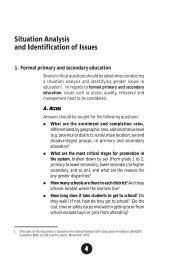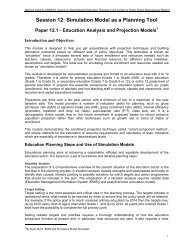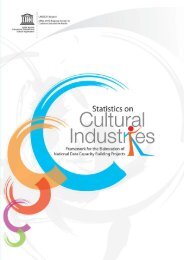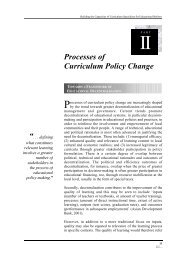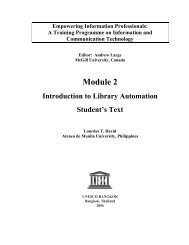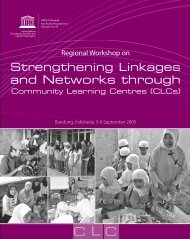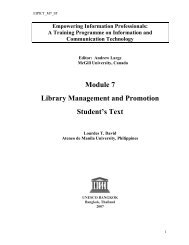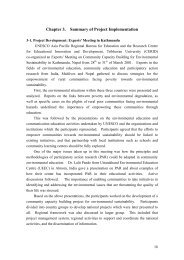Educational Finance in Thailand - UNESCO Bangkok
Educational Finance in Thailand - UNESCO Bangkok
Educational Finance in Thailand - UNESCO Bangkok
Create successful ePaper yourself
Turn your PDF publications into a flip-book with our unique Google optimized e-Paper software.
F<strong>in</strong>al Report, Volume II/3 Anthony. Cresswell: <strong>Educational</strong> <strong>F<strong>in</strong>ance</strong> <strong>UNESCO</strong>-PROAP TA 2996-THA<br />
Education Management and <strong>F<strong>in</strong>ance</strong> Study July 1999<br />
3.2.2.1. Overall education budget and expenditure patterns<br />
The overall level of f<strong>in</strong>ancial allocation from the Government and private sources<br />
appears to be roughly <strong>in</strong> l<strong>in</strong>e with other countries <strong>in</strong> the region. But there is still a<br />
gap between <strong>Thailand</strong>’s level of <strong>in</strong>vestment <strong>in</strong> education and that of more<br />
developed countries. Longer term plann<strong>in</strong>g should <strong>in</strong>clude goals of <strong>in</strong>creas<strong>in</strong>g the<br />
allocations to education to at least 5 per cent of GDP, which would be achieved by<br />
ma<strong>in</strong>ta<strong>in</strong><strong>in</strong>g the recent upward trend. The balance among types of expenditure for<br />
the current and recent past budgets seems tipped <strong>in</strong> favor of heavier <strong>in</strong>vestment on<br />
the capital side. It is not clear whether this is a result of specific policies to<br />
enhance <strong>in</strong>frastructure, or just the accumulated effect of uncoord<strong>in</strong>ated decisions.<br />
The new f<strong>in</strong>ance policies, especially expand<strong>in</strong>g opportunities for secondary<br />
education may require cont<strong>in</strong>ued high capital expenditure <strong>in</strong> the short run to build<br />
the necessary facilities. The Government should conduct a detailed facility<br />
capacity study to exam<strong>in</strong>e this possibility. Expenditures on central adm<strong>in</strong>istration<br />
also appear to be larger than necessary, and will probably drop as a result of<br />
downsiz<strong>in</strong>g and consolidation of central M<strong>in</strong>istries. The level of expenditure on<br />
higher education subsidies cannot be justified on either efficiency or equity<br />
grounds and should be reduced. Increased <strong>in</strong>vestments <strong>in</strong> pre-primary and primary<br />
education quality and access are likely to produce greater returns <strong>in</strong> terms of<br />
overall quality and efficiency. Distribution of f<strong>in</strong>ancial and teacher resources<br />
appears to treat most prov<strong>in</strong>ces and regions equally, but does little to compensate<br />
for economic disadvantages. The allocation of f<strong>in</strong>ancial resources to higher<br />
education is an exception to this general pattern, s<strong>in</strong>ce higher education resource<br />
allocations tend to be disequaliz<strong>in</strong>g, go<strong>in</strong>g disproportionately to wealthier<br />
prov<strong>in</strong>ces.<br />
3.2.2.2 Block grants and salaries<br />
a. The block grant approach, if fully implemented, should cover all the school<br />
f<strong>in</strong>ancial resources, <strong>in</strong>clud<strong>in</strong>g staff salaries. S<strong>in</strong>ce these salaries and the staff that<br />
go with the salaries are such a large and important component of the operation,<br />
they should be subject to managerial control and decision mak<strong>in</strong>g at the<br />
operational (<strong>in</strong>stitutional) level. That is, the fund<strong>in</strong>g of staff salaries, as well as the<br />
f<strong>in</strong>anc<strong>in</strong>g of other resources, should <strong>in</strong> effect follow the children. However,<br />
allow<strong>in</strong>g local control over salaries and staff employment is a major departure<br />
from the current arrangements. To implement the block grant approach to staff<strong>in</strong>g<br />
and salaries <strong>in</strong> a short period of time could be very disruptive to morale, overall<br />
staff<strong>in</strong>g patterns, and abruptly place a large additional adm<strong>in</strong>istrative load on the<br />
local adm<strong>in</strong>istrators. The move to the full block grant approach should therefore<br />
be planned over a longer time frame and proceed <strong>in</strong> stages. The description of the<br />
f<strong>in</strong>ance scheme also raises a number of possible issues of personnel and salary<br />
policy. For some of these issues, it is assumed that the exist<strong>in</strong>g personnel policies<br />
with respect to benefits, pensions, and matters of rout<strong>in</strong>e personnel adm<strong>in</strong>istration<br />
will rema<strong>in</strong> unchanged. The ma<strong>in</strong> changes will be <strong>in</strong> the locus of the hir<strong>in</strong>g and<br />
retention decision, and the establishment of salary levels. The issues of salary<br />
levels and hir<strong>in</strong>g are discussed below.<br />
91



